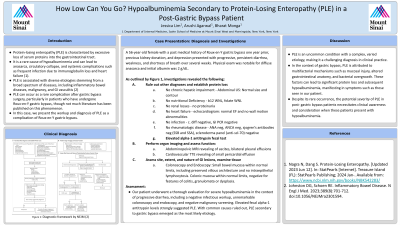Tuesday Poster Session
Category: Stomach
P5091 - How Low Can You Go? Hypoalbuminemia Secondary to Protein Losing Enteropathy (PLE) in a Post-Gastric Bypass Patient
Tuesday, October 29, 2024
10:30 AM - 4:00 PM ET
Location: Exhibit Hall E

Has Audio
- JL
Jessica Lim, DO
Mount Sinai West/Morningside
New York, NY
Presenting Author(s)
Arushi Agarwal, MD1, Jessica Lim, DO2
1Mount Sinai West, Icahn School of Medicine at Mount Sinai, New York, NY; 2Mount Sinai West/Morningside, New York, NY
Introduction: Protein-losing enteropathy (PLE) is characterized by excessive loss of serum proteins into the gastrointestinal tract. It is a rare cause of hypoalbuminemia and can lead to anasarca, circulatory collapse, and systemic symptoms. PLE is associated with diverse etiologies stemming from a broad spectrum of diseases. It can occur as a rare complication after gastric bypass surgery, particularly in patients who have undergone Roux-en-Y gastric bypass, though not much literature has been published on this phenomenon. We present a case of PLE after Roux-en-Y gastric bypass.
Case Description/Methods: A 56-year-old female with a past medical history of Roux-en-Y gastric bypass one year prior, previous kidney donation, and depression presented with progressive, persistent diarrhea, weakness, and shortness of breath over several weeks. Physical exam was notable for diffuse anasarca and initial albumin was 2 g/dL. She underwent comprehensive evaluation for severe hypoalbuminemia, including infectious workup, colonoscopy and endoscopy, and malignancy screening. She was found to have an elevated alpha-1 antitrypsin fecal test. Hypoalbuminemia workup was negative for common causes, and PLE as a sequela of gastric bypass was found to be the most probable etiology.
Discussion: PLE occurs via three mechanisms: inflammatory exudation, increased mucosal permeability, and intestinal loss of lymphatic fluid. The etiology of PLE encompasses a range of disorders, including primary intestinal lymphangiectasia, inflammatory bowel diseases, infections, congestive heart failure, and post-surgical states. Diagnostic evaluation typically involves laboratory tests demonstrating low serum albumin and increased fecal alpha-1 antitrypsin clearance alongside imaging and endoscopy.
PLE is an uncommon condition with a complex, varied etiology, making it a challenging diagnosis in clinical practice. In the context of gastric bypass, PLE is attributed to multifactorial mechanisms such as mucosal injury, altered gastrointestinal anatomy, and bacterial overgrowth. These factors can lead to significant protein loss and subsequent hypoalbuminemia, manifesting in symptoms such as those seen in our patient. Despite its rare occurrence, the potential severity of PLE in post- gastric bypass patients necessitates clinical awareness and consideration when these patients present with hypoalbuminemia.
Disclosures:
Arushi Agarwal, MD1, Jessica Lim, DO2. P5091 - How Low Can You Go? Hypoalbuminemia Secondary to Protein Losing Enteropathy (PLE) in a Post-Gastric Bypass Patient, ACG 2024 Annual Scientific Meeting Abstracts. Philadelphia, PA: American College of Gastroenterology.
1Mount Sinai West, Icahn School of Medicine at Mount Sinai, New York, NY; 2Mount Sinai West/Morningside, New York, NY
Introduction: Protein-losing enteropathy (PLE) is characterized by excessive loss of serum proteins into the gastrointestinal tract. It is a rare cause of hypoalbuminemia and can lead to anasarca, circulatory collapse, and systemic symptoms. PLE is associated with diverse etiologies stemming from a broad spectrum of diseases. It can occur as a rare complication after gastric bypass surgery, particularly in patients who have undergone Roux-en-Y gastric bypass, though not much literature has been published on this phenomenon. We present a case of PLE after Roux-en-Y gastric bypass.
Case Description/Methods: A 56-year-old female with a past medical history of Roux-en-Y gastric bypass one year prior, previous kidney donation, and depression presented with progressive, persistent diarrhea, weakness, and shortness of breath over several weeks. Physical exam was notable for diffuse anasarca and initial albumin was 2 g/dL. She underwent comprehensive evaluation for severe hypoalbuminemia, including infectious workup, colonoscopy and endoscopy, and malignancy screening. She was found to have an elevated alpha-1 antitrypsin fecal test. Hypoalbuminemia workup was negative for common causes, and PLE as a sequela of gastric bypass was found to be the most probable etiology.
Discussion: PLE occurs via three mechanisms: inflammatory exudation, increased mucosal permeability, and intestinal loss of lymphatic fluid. The etiology of PLE encompasses a range of disorders, including primary intestinal lymphangiectasia, inflammatory bowel diseases, infections, congestive heart failure, and post-surgical states. Diagnostic evaluation typically involves laboratory tests demonstrating low serum albumin and increased fecal alpha-1 antitrypsin clearance alongside imaging and endoscopy.
PLE is an uncommon condition with a complex, varied etiology, making it a challenging diagnosis in clinical practice. In the context of gastric bypass, PLE is attributed to multifactorial mechanisms such as mucosal injury, altered gastrointestinal anatomy, and bacterial overgrowth. These factors can lead to significant protein loss and subsequent hypoalbuminemia, manifesting in symptoms such as those seen in our patient. Despite its rare occurrence, the potential severity of PLE in post- gastric bypass patients necessitates clinical awareness and consideration when these patients present with hypoalbuminemia.
Disclosures:
Arushi Agarwal indicated no relevant financial relationships.
Jessica Lim indicated no relevant financial relationships.
Arushi Agarwal, MD1, Jessica Lim, DO2. P5091 - How Low Can You Go? Hypoalbuminemia Secondary to Protein Losing Enteropathy (PLE) in a Post-Gastric Bypass Patient, ACG 2024 Annual Scientific Meeting Abstracts. Philadelphia, PA: American College of Gastroenterology.

